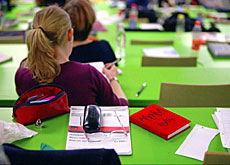Senate supports funding for foreign students

The Senate has backed a plan calling on the government to cover the costs of foreign students at Swiss universities.
There is much debate in Switzerland on the issue of funding of higher education, with costs spiralling upwards over the past few years.
Swiss higher education institutions – ten universities, two federal institutes of technology and seven institutes of applied sciences – enjoy an excellent reputation.
It is therefore not surprising that Switzerland has, together with Australia, the highest rate of foreign students registered for courses (23 per cent).
But over the last few years these “jewels” in the academic crown have been facing growing funding problems, due to a steep rise in costs, which are already in excess of SFr4 billion ($3 billion) a year.
Increasing numbers
One of the main reasons is a steady increase in the number of students. This year, for example, numbers were up three per cent on last year. And over the next ten years a further 20 per cent increase is forecast.
Another factor is that scientific research is becoming more and more sophisticated. If Swiss universities are to compete with their counterparts in other countries, more investment is required.
The Bologna reform, which aims to harmonise the European university system, is also likely to increase costs. Between now and 2010, it is estimated that it will cost Swiss universities almost SFr300 million to adapt their teaching to conform with the new study cycles and diplomas.
Costs
At present, the average cost of a university course is SFr20,000 a year for humanities, SFr40,000 for scientific subjects and over SFr60,000 for medical studies.
These costs are borne by the taxpayer because all the main institutions of higher education are publicly funded. The government funds the two federal institutes of technology, while the cantons pay for the universities.
As not even half of the cantons offer university-level education, a system of inter-cantonal financial compensation exists to balance out expenditure – a classic example of Swiss federalism working in practice.
The cantons that have universities receive a contribution for every student coming from another canton.
“In the case of institutes of applied sciences, for example, the contribution amounts to 85 per cent of the cost of educating a student,” explains Gabriela Fuchs of the Swiss Conference of Cantonal Directors of Public Education.
Call for help
But for foreign students, the cantons that have universities do not receive any contribution from the students’ countries of origin.
“We are therefore asking the government to act as a 27th canton and pay a similar contribution for foreign students,” says Fuchs.
This proposal is the subject of a parliamentary motion, already approved by the House of Representatives and accepted by the Senate on Tuesday.
According to the promoter of the proposal, former Liberal Party parliamentarian Christine Wirz-von Planta, “it is the federal government’s duty to cover the costs of foreign students, given that the whole of Switzerland benefits”.
The argument is that foreign students form a pool of gifted, well-qualified researchers, on which the Swiss labour market draws freely, and opening the doors to foreign students enables young Swiss people to attend higher education institutions in other countries.
Controversial proposals
But it appears that not even this additional money from the government, which already subsidises the cantonal universities to the tune of SFr400 million a year, will solve the problem of university funding.
In recent years, some universities have therefore begun to rationalise by doing away with “minor” departments – an approach which has led to much argument and controversy.
Equally controversial is the proposal to increase university fees from the current average of SFr1,500 a year.
“There is a danger that this would penalise Swiss universities, given that fees are very low in many other countries,” argues Mathias Stauffacher, General Secretary of the Rectors’ Conference of Swiss Universities.
“Increases in fees should not be considered until the bursary system, which differs a great deal between cantons, has been improved and harmonised.”
Nor do most Swiss university rectors support the idea of imposing higher fees on foreign students, an idea so far adopted only by Lugano University, Stauffacher explains.
“We do not want our own students to be discriminated against abroad. And it should not be forgotten that exchanges involving foreign students have always been fundamental to the development of Swiss universities.”
swissinfo, Armando Mombelli
In 2004, about 110,000 students were registered at Swiss universities and institutes of technology.
Another 40,000 were attending universities of applied sciences.
23% per cent were foreign students.
University fees are set at an average of SFr1,500 a year.
The annual cost of higher education in Switzerland is just over SFr4 billion.
Switzerland has ten universities, two federal institutes of technology and seven institutes of applied sciences.
The government is responsible for the federal institutes in Zurich and Lausanne, and for some of the universities of applied sciences (in the fields of technology, economics and art).
Universities, on the other hand, are the responsibility of their respective cantons. Every year, the government pays out almost SFr400 million to support these institutions.

In compliance with the JTI standards
More: SWI swissinfo.ch certified by the Journalism Trust Initiative












You can find an overview of ongoing debates with our journalists here . Please join us!
If you want to start a conversation about a topic raised in this article or want to report factual errors, email us at english@swissinfo.ch.